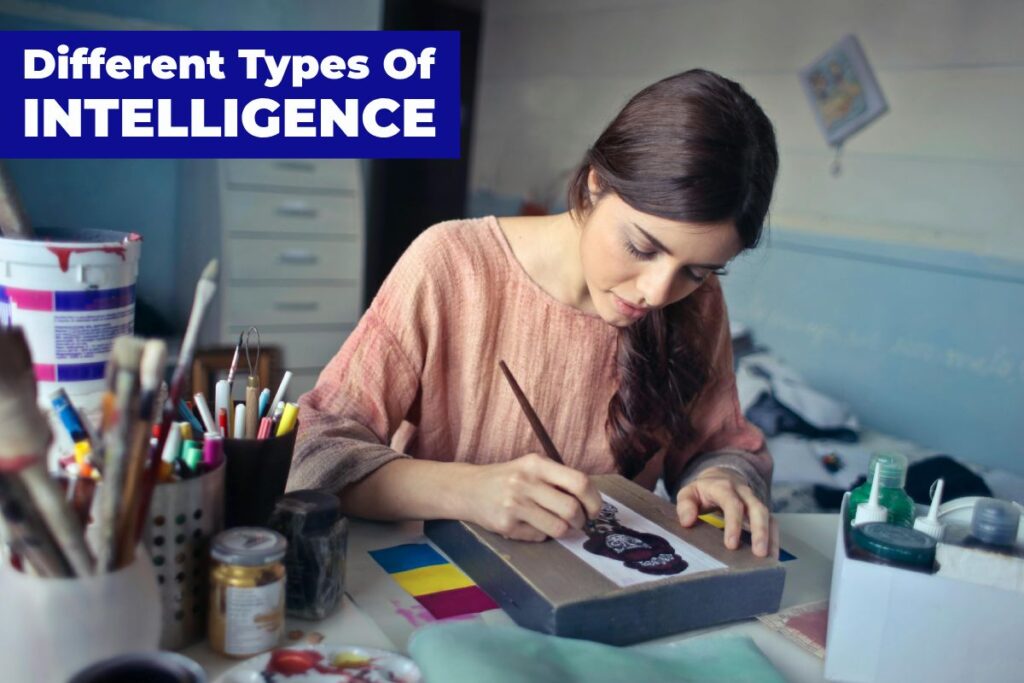
Woman in Brown Scoop-neck Long-sleeved Blouse Painting
Types of Intelligence
Most people don’t believe there are different types of intelligence. The traditional notion of intelligence, often associated with IQ testing, has long dominated our understanding of cognitive abilities.
Intelligence has been commonly perceived as an innate intellectual potential, something we are born with and can be quantified through standardized assessments.
However, in recent decades, a more nuanced and expansive view of intelligence has emerged, thanks to the groundbreaking work of Harvard psychologist Howard Gardner.
Gardner proposed the theory of multiple intelligences, challenging the conventional idea of a single, monolithic form of intelligence.
In this article, we’ll move beyond the limitations of IQ and explore different types of intelligence, as proposed in Howard Gardner’s theory of multiple intelligences.
Theory of Multiple Intelligences
Intelligence is a complex and multifaceted concept that can be challenging to define precisely.
It encompasses a range of cognitive abilities, problem-solving skills, and the capacity to learn, reason, and adapt to new situations.
Intelligence involves the ability to understand, analyze, and apply information, as well as the capacity for critical thinking, creativity, and effective decision-making.
Traditionally, intelligence has been primarily measured and quantified through standardized tests, such as IQ (Intelligence Quotient) tests.
These tests typically assess an individual’s verbal, mathematical, and logical reasoning abilities.
However, it is important to note that intelligence extends beyond the parameters measured by these tests.
In recent years, there has been a shift towards broader and more inclusive perspectives on intelligence.
Psychologists and researchers have proposed various theories and models that emphasize different aspects of intelligence.
Here are some of the most widely recognized:
1. Gardner’s Multiple Intelligences:
Developed by Howard Gardner, this theory proposes that intelligence is not singular but rather a spectrum of eight intelligences. These intelligences include:
- Linguistic Intelligence (language skills)
- Logical-Mathematical Intelligence (problem-solving, logic)
- Spatial Intelligence (visual-spatial skills)
- Bodily-Kinesthetic Intelligence (physical coordination)
- Musical Intelligence (musical abilities)
- Interpersonal Intelligence (social skills)
- Intrapersonal Intelligence (self-awareness)
- Naturalistic Intelligence (nature, environment)
Howard Gardner’s expanded the list with:
- Existential Intelligence (philosophical thinking)
- Moral Intelligence (ethical reasoning)
Everyone possesses a unique blend of these intelligences and may excel in some areas more than others.
This theory has had a significant impact on education, encouraging educators to cater to diverse learning styles.
2. Triarchic Theory of Intelligence (Robert Sternberg):
Robert Sternberg’s triarchic theory focuses on three aspects of intelligence:
- Analytical Intelligence (problem-solving)
- Creative Intelligence (generating new ideas)
- Practical Intelligence (applying knowledge in real-life situations)
According to Sternberg, true intelligence involves a balance of all three aspects. This theory emphasizes the importance of creativity and practical application of knowledge, along with analytical skills.
3. Emotional Intelligence (Peter Salovey and John D. Mayer):
Peter Salovey and John D. Mayer are two psychologists widely recognized for their groundbreaking work on emotional intelligence. They developed the concept of emotional intelligence as a way to understand and measure the ability to perceive, understand, manage, and use emotions effectively.
According to Salovey and Mayer, emotional intelligence consists of four key components:
- Perceiving Emotions
- Understanding Emotions
- Managing Emotions
- Using Emotions
4. Fluid and Crystallized Intelligence (Raymond Cattell):
Raymond Cattell proposed a distinction between two broad categories of intelligence:
- Fluid Intelligence (reasoning, problem-solving)
- Crystallized Intelligence (stored knowledge, experience)
Fluid intelligence refers to our ability to think abstractly, solve problems, and adapt to new situations. It’s often associated with reasoning and critical thinking skills.
Crystallized intelligence, on the other hand, refers to our accumulated knowledge and skills. It encompasses the knowledge we gain through education and experience. Fluid intelligence tends to decline with age, while crystallized intelligence can continue to grow throughout our lives.
These theories and models showcase the vast spectrum of human cognitive abilities, suggesting that intelligence is a multifaceted construct.
However, for this article, we will delve specifically into Howard Gardner’s Theory of Multiple Intelligences.
Different Types of Intelligence (Gardner’s Multiple Intelligences)
One prominent and widely discussed theory is the Theory of Multiple Intelligences, developed by Howard Gardner, a psychologist and professor at Harvard University. According to Gardner’s theory, intelligence is not a single, unified concept but rather a multifaceted construct composed of various independent intelligences.
Gardner initially proposed seven different types of intelligences in his theory and later expanded the list to include an eighth intelligence.
According to Gardner’s theory, there are eight distinct types of intelligence:
- Linguistic Intelligence (language skills)
- Logical-Mathematical Intelligence (problem-solving, logic)
- Spatial Intelligence (visual-spatial skills)
- Bodily-Kinesthetic Intelligence (physical coordination)
- Musical Intelligence (musical abilities)
- Interpersonal Intelligence (social skills)
- Intrapersonal Intelligence (self-awareness)
- Naturalistic Intelligence (nature, environment)
- Existential Intelligence (philosophical thinking)
- Moral Intelligence (ethical reasoning)
Each intelligence represents a distinct way of processing information and engaging with the world.
Let’s explore these multiple intelligences in more detail.
1. Linguistic Intelligence (Language Skills)
This type of intelligence involves a strong command of language, both spoken and written.
Individuals with this type of intelligence excel in activities such as listening, speaking, writing, and teaching.
Their ability to understand and manipulate language makes them adept at expressing themselves clearly and persuasively.
Careers that suit people with high verbal-linguistic intelligence include poet, journalist, writer, teacher, lawyer, politician, and translator.
2. Logical-Mathematical Intelligence (Problem-Solving, Logic)
This type of intelligence relates to logical reasoning, critical thinking, and problem-solving abilities.
People with strong mathematical-logical intelligence are skilled in problem solving, logical reasoning, and performing experiments.
They often enjoy tackling complex problems and can think analytically.
Suitable career paths for individuals with this intelligence include scientist, engineer, accountant, and mathematician.
3. Musical Intelligence (Musical Abilities)
Musical intelligence refers to the ability to understand, appreciate, and create music. Individuals with this intelligence have a heightened sensitivity to rhythm, melody, and pitch.
They are often skilled in singing, playing musical instruments, composing music, and discerning subtle auditory nuances.
Moreover, they have a natural ability to understand and create musical structures and are sensitive to sounds in their environment.
Careers that align with musical intelligence include musician, disc jockey, singer, and composer.
4. Spatial Intelligence (Visual-Spatial Skills)
Spatial intelligence involves visual thinking, spatial reasoning, and the ability to mentally manipulate objects and images.
People with strong spatial intelligence are adept at tasks such as map reading, navigating in physical spaces, and visualizing abstract concepts.
They usually excel in activities such as puzzle building, painting, constructing, fixing, and designing objects.
Besides, they have a strong ability to perceive and manipulate visual and spatial information.
Career options for those with visual-spatial intelligence include sculptor, artist, inventor, architect, mechanic, and engineer.
5. Bodily-Kinesthetic Intelligence (Physical Coordination)
This type of intelligence centers around physical movement, coordination, and dexterity.
Individuals with high bodily-kinesthetic intelligence excel in activities that require body control, such as sports, dance, acting, and other physical performances.
They have excellent coordination and often use their physical skills to solve problems and create things.
Careers that fit bodily kinesthetic intelligence include athlete, PE teacher, dancer, actor, and firefighter.
6. Interpersonal Intelligence (Social Skills)
Interpersonal intelligence relates to understanding and interacting effectively with others.
People with strong interpersonal intelligence possess excellent social skills, empathy, and the ability to perceive and interpret others’ emotions and intentions accurately.
They are skilled at seeing things from other perspectives, showing empathy, counseling, and cooperating with others.
They also excel in social interactions and often build positive relationships easily.
Career choices for individuals with high interpersonal intelligence include counselor, salesperson, politician, businessperson, and minister.
7. Intrapersonal Intelligence (Self-Awareness)
Intrapersonal intelligence involves self-awareness, introspection, and understanding one’s own thoughts, emotions, and motivations.
Individuals with intrapersonal intelligence have a deep understanding of themselves, their strengths, weaknesses, and goals.
They usually reflect on their thoughts and emotions and understand their motivations.
Also, they often enjoy self-reflection and analyzing theories and ideas.
Suitable careers for those with intrapersonal intelligence include those of researcher, theorist, and philosopher.
8. Naturalistic Intelligence (Nature, Environment)
Gardner later added naturalistic intelligence to his theory, recognizing individuals’ ability to connect with and understand the natural world.
Those with high naturalistic intelligence display a heightened sensitivity to nature, are skilled at categorizing and classifying natural phenomena, and have a keen awareness of environmental issues.
They also enjoy activities such as camping, gardening, and exploring the outdoors.
Career options for people with high naturalist intelligence include scientists, naturalists, and landscape architects.
9. Existential Intelligence (Philosophical Thinking)
Existential intelligence involves a profound sensitivity and capacity to tackle deep questions about human existence.
Individuals with this type of intelligence contemplate fundamental issues such as the meaning of life, the reasons behind our mortality, and the origins of our existence.
Their ability to engage with these profound topics sets them apart as deep thinkers, often driven by a desire to understand the larger purpose and significance of human life.
Career paths for individuals with strong existential intelligence include scientist, philosopher, and theologian.
The Impact of Gardner’s Different Types of Intelligences
It’s important to note that Gardner’s Theory of Multiple Intelligences challenges the traditional notion of intelligence as solely measured by IQ tests or academic aptitude.
According to Gardner, each person possesses a unique combination of these intelligences, and individuals may excel in one or more areas while being less proficient in others.
This theory has had a significant impact on education, emphasizing the importance of recognizing and nurturing diverse forms of intelligence.
It highlights the need for educational approaches that cater to different strengths and learning styles, promoting a more inclusive and holistic understanding of intelligence.
The Theory of Multiple Intelligences has garnered both support and criticism. However, it has sparked valuable discussions and influenced educational practices worldwide.
This theory encourages educators to adopt a broader perspective on intelligence and tailor their teaching methods to accommodate diverse learners.
Furthermore, this revolutionary perspective acknowledges that individuals may possess varying strengths and aptitudes across these diverse domains, rather than being confined to a single, universal measure of intellectual capacity.
By embracing the concept of multiple intelligences, we can gain a more holistic understanding of the human mind, recognizing that intellectual potential manifests in various forms.
This shift in perspective encourages us to celebrate and nurture the unique talents and abilities of each individual, rather than limiting our assessment of intelligence to a single, standardized metric.
As we continue to explore the complexities of human cognition, the theory of multiple intelligences serves as a profound reminder that intelligence is a multifaceted and dynamic phenomenon, transcending the traditional boundaries of IQ testing.
Final Note
Intelligence is not solely determined by genetics or innate abilities.
It is influenced by a complex interplay of genetic factors, environmental factors, experiences, education, and individual motivation.
This dynamic and malleable trait can be developed and enhanced through learning, practice, and exposure to new ideas and experiences.
It’s important to recognize that intelligence is not a measure of a person’s worth or potential.
Each individual possesses unique strengths and abilities, and we should appreciate intelligence in its diverse forms.
Embracing this broader understanding allows for a more inclusive and holistic approach to education, where the varied talents and abilities of individuals are recognized and nurtured.
Gardner’s different types of intelligence discussed in this article showcase the diverse ways we can function and thrive intellectually.
So, know your intellectual strengths and develop them further.
Sharing valuable content is a great way to help others! If you found this post about “Types of Intelligence” helpful or think it might be useful to others, please feel free to share it. You never know who might need this information. Thank you!







